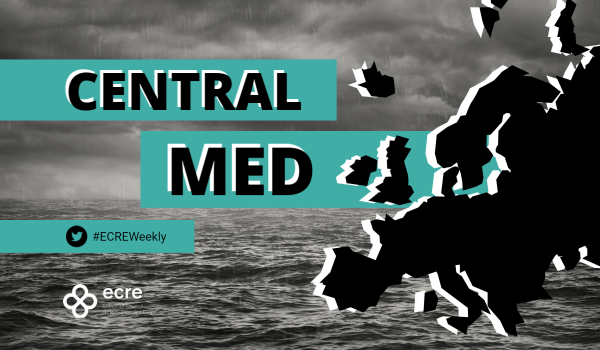Over 500 people have died on the Central Mediterranean route since the beginning of the year despite civilian rescue efforts. The number of people intercepted and returned to Libya in 2022 now exceeds 4,200 people. Arrivals to Cyprus increase by 300% and people are facing appalling conditions in the country’s only registration centre.
According to the International Organization of Migration (IOM) the Central Mediterranean is the most dangerous migration route in the world. Almost 24,000 people have lost their lives on the route since 2014 and as of 23 April, the UN agency estimates that 511 people have died or gone missing while attempting to reach Europe in 2022. Between 23-24 April more than 20 people lost their lives off the coasts of Libya and Tunisia, with the city of Sfax (Tunisia) becoming a major departure point for people from Africa and the Middle East. The Tunisian coast guard reported that four boats heading to Italy and carrying 120 migrants had sunk near Sfax, leaving 17 dead. On 24 April, three more bodies were retrieved. The bodies recovered are being distributed among different regions due to the lack of space in local cemeteries. At least six people including a child drowned off the coast of Lebanon after departing for Europe in a shipwreck following a confrontation with the Lebanese navy. The boat was carrying around 60 people: 48 were rescued but six people remain missing. Lebanon’s dire financial crisis has plunged more than three quarters of the population into poverty, prompting many Lebanese to leave the country.
Between 23-25 April more than 260 migrants were rescued. On Saturday morning, 101 people including four children and a pregnant woman in distress were rescued northwest Libya by the Médecins Sans Frontières (MSF) operated vessel Geo Barents. The crew of the Ocean Viking rescued 164 people including 64 children off the coast of Libya between Sunday and Monday. Both rescue ships are now waiting to be assigned a port of disembarkation. “The continued loss of life in the Mediterranean must not be normalized. Human lives are a cost of inaction. Dedicated search and rescue capacity and a safe disembarkation mechanism are urgently needed to prevent further deaths and suffering”, the IOM said. This week Sea-Watch International reported that Libyan authorities are preventing them from flying operations within the Libyan SAR zone, leaving the area unmonitored. On 22 April, the International Commission of Jurists (ICJ) issued a briefing paper on “Criminalization of humanitarian and other support and assistance to migrants and the defence of their human rights in the EU”. The paper analyses the international and EU legal framework governing the criminalization and focuses on the initiation of administrative and criminal proceedings against vessels engaged in SAR activities and the provision of legal aid and other support to migrants.
In the period 17 and 23 April, the IOM reported that 202 people were intercepted in the Mediterranean and returned to Libya. So far in 2022, the number of migrants returned exceeds 4,200. On 24 April, while preparing to depart for Europe in inflatable boats, more than 540 migrants were arrested near a beach in Misrata, most of them Bangladeshi nationals. On the same day they were transferred to a detention centre near Tripoli where “humanitarian aid will be provided until they are deported to their countries”, an official at the interior ministry’s anti-illegal immigration body said. However, numerous testimonies and mounting evidence reveals that they are likely to face violence, torture and food deprivation. Despite the human rights violations reported by the Human Rights Council in its 49th session, Francisco Gaztelu Mezquiriz, a senior EU Commission official, said that the commission’s actions on border and migration management in Libya “cannot be considered harmful when it actually helps save lives”. “We strongly believe that increasing the effectiveness of the Libyan search and rescue operations can only help to reduce the number of lives lost at sea”, he added.
Irregular arrivals to Cyprus has increased by 300% in the first period of 2022 as a result of a surge in arrivals, said the EU border agency Frontex. On 28 April, 25 Syrian refugees, including five children, were apprehended and kept on a boat off the coast of Cyprus awaiting disembarkation. The Pournara centre – the only asylum registration centre on the island with capacity for 1,000 people – currently hosts 3,000 migrants. Most of them cannot be accommodated in the original containers but sleep in tents installed as an emergency measure. The country’s commissioner for the Rights of the Child described the hygienic conditions as “appalling”. On top of that, “the roughly 300 children housed at the centre often end up sleeping on the floor and are forced to share two toilets and a single shower room”, she added.
For further information:
- ECRE, Central Med: Rescues Continue to Rise in the Deadliest Sea Route to Europe, Pope Francis condemns EU’s complicity with Libya, Returns to Libya Continue Unabated, April 2022
- ECRE, Central Med: Rescues and Death Toll Continue to Rise, Germany to stop training the so-called Libyan Coast Guard, Pope Francis Calls on Malta to Welcome refugees, April 2022
This article appeared in the ECRE Weekly Bulletin. You can subscribe to the Weekly Bulletin here.

